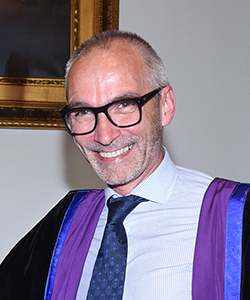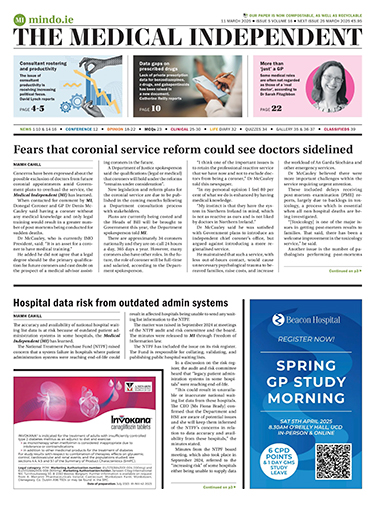A long-term commitment on consultant numbers and training places is required, say doctors in key strategic roles. David Lynch reports
Consultant numbers are on the rise. However, the three most recent specialty specific reviews published by HSE National Doctors Training and Planning (NDTP) highlighted the need for major increases in anaesthesiologists, surgeons, and emergency medicine (EM) consultants in the coming years.
The NDTP annual workforce conference, which was held in Dublin last month, focused on planning for the “evolving” health system.
Against the background of regional reorganisation and the broader implementation of Sláintecare, doctors charged with planning for the future said they needed long-term commitment on consultant numbers and training places.
“Funding is the big thing,” Dr Michael Dockery, Consultant Anaesthesiologist and Clinical Lead, National Clinical Programme for Anaesthesia, told the Medical Independent (MI) after he addressed the conference in Dublin.
Earlier this year, NDTP projected that Ireland will need to double the number of anaesthesiologists by 2038 to meet patient needs (see panel p4).
“We require funding to be able to achieve the right number of trainees, because it costs a little bit extra for specialist trainees,” said Dr Dockery. “We have a training arrangement whereby we have to have enough tutors for them. So there is an expense in achieving the numbers of the trainees that we require.”
Dr Dockery added that funding is also required “for the consultant posts themselves”.
Mr Ken Mealy, Consultant General Surgeon and Joint Clinical Lead of the National Clinical Programme in Surgery, told MI he regarded long-term financial backing as the biggest challenge to the implementation of the NDTP surgical workforce plan.

“That challenge is about funding for consultant [posts] at the end of training and then funding for the programmes to train these doctors,” he informed MI after launching the plan at the conference (see panel p5).
The amount of change in the health service in the last couple of months has been significant
The NDTP surgical plan recommends the annual “setting and monitoring” of recruitment targets. Mr Mealy raised concerns that the consultant posts required in the next 10-to-15 years “haven’t been funded” yet. He added that the “year-by-year basis” of investment through the HSE’s annual national service plans made long-term planning difficult.
Mr Mealy said it was important to have “some certainty” regarding the expansion of consultant numbers.
“I think that would allow the training body to plan and we do need to plan because it is a 12-to-14-year lead-in time for a surgeon.”
He added that assurance regarding future posts would allow early-career doctors to “make conscious decisions that they want to be a particular type of surgeon, knowing that there is a consistent number of those surgeons
that will be appointed in the next 10-to-15 years.”
In late November, NDTP published its Emergency Medicine Workforce in Ireland 2024-2038 report, which also projected the need for a major increase in EM consultants by 2038.
According to the report, approximately 182 whole-time equivalent (WTE) EM consultants worked in HSE-funded services in June this year. This figure would need to increase to 335 WTEs by 2038 to account for increasing patient demand, including in paediatric emergency care.
Asked whether there was clarity on long-term funding for consultant and training positions, the new NDTP Medical Director Prof Anthony O’Regan told MI: “The short answer is we are not sure.”
Prof O’Regan, Consultant in Respiratory and Internal Medicine in University Hospital Galway, became NDTP Medical Director in September. He outlined that the uncertainty partly arose out of the period of flux that the health system is currently experiencing, with the creation of the six health regions.
“The amount of change in the health service in the last couple of months has been significant,” he told MI. “It really is about trying to look at the regional arm of planning now.”
He said it was important that the regions were “resourced in a way that we feel is appropriate”, that the “skillset and know-how” is in place to define the jobs needed at a regional level and that they align with the models of care provided by the HSE.
If these factors were in place, the aim would be for resources to be provided to the regions so they can carry out recruitment.

“How [the HSE] will do that? Honestly, I am not 100 per cent sure,” he added. “But I would say if we don’t have clarity on our workforce for five and 10 years from now, we are not going to retain trainees.” Prof O’Regan said he meant clarity in terms of funding for training positions and “commitment that these [consultant] jobs will come”.
He pointed to NDTP qualitative data which showed that once doctors left Ireland, “even if they want to come back, life goes on, and they may lose that opportunity”.
“But I think if someone leaves the country and knows that these jobs are definitely going to occur [in the future] they will plan for them,” he noted. Without the certainty of a multi-annual funded plan, “we are going to keep on losing a lot of our talented doctors.”
Regionalisation
The foundation of the six health regions earlier this year means that NDTP is now working in a very different environment when it comes to engaging with health management. The health regions will have control of appointments at their own regional level.
During his address to the conference, Mr Mealy commented that the impact of regionalisation on workforce planning “concerned” him.
“There is going to be more independence for the regional health areas,” he told attendees. “And I would really be concerned that the regions will cherry-pick what they want out of workforce planning and models of care for that matter.”
Mr Mealy said he “strongly” believed that a central process with oversight of models of care and workforce planning is needed so “we can get equity around the country”.
Will this dilution of recruitment decision-making from the centre make it more difficult to implement NDTP workforce plans?
“We have to embrace opportunity,” Prof O’Regan responded. “I think as long as we work closely with the leaders in the regions, we hope that we will be able to allow an equitable distribution of resources.”
However, he cautioned that “we have to be careful that we don’t lose all of the central planning”, adding that a lot of “good work” has been done on this issue at the HSE centre.
“One of our main aims in 2025 is how we distil that information – with the skillset we have developed at NDTP in terms of workforce planning and training – down to the [regional] level now.”
Prof O’Regan conceded “there is always a risk in change”, but remained confident that NDTP could “embrace” it.
According to the Minister for Health Stephen Donnelly, the introduction of the new public-only consultant contract (POCC) last year had assisted efforts to improve recruitment and retention
of consultants.
Dr Dockery, who works in University Hospital Waterford, told MI that “most” of his colleagues had “switched over” to the POCC. Reflecting on the impact of the new contract, Dr Dockery
said that generally the number of applicants for consultant posts in Ireland “has increased”.
“I think that many trainees from abroad find it more attractive now, with that particular contract. So there have been improvements associated with it [POCC].”
While emphasising that NDTP’s main focus is on doctors who are currently in training in Ireland, Prof O’Regan said the contract may have some positive impacts on doctor employment.
“We do know that retention rates have gone up since the new contract has been put in place,” Prof O’Regan told MI. He noted that there was an international HSE campaign “outside of NDTP” to raise awareness of the POCC, which had been “very well received” by Irish doctors working abroad.
While noting that some recent retention statistics had “been very encouraging”, Prof O’Regan said the real impact of the POCC on recruitment will only be known over the next few years.
“The real metric of success will be year-on-year when we begin to see those numbers.”
NDTP data showed that “90 per cent” of doctors working in Ireland would like to stay long-term. “The question then is: Will we be able to accommodate that number and is 90 per cent our target number [for retention] and what’s a realistic target for retention? So we have to work that out.”
Overall, Prof O’Regan said he believed the POCC “has been a success” thus far. “But we do need to give it time to bed-in and see where it goes,” he added.
NCHD taskforce
From the perspective of NDTP, Prof O’Regan identified two main issues arising out of the NCHD taskforce’s final report, which was published early this year.
“The report has established that we need [workforce] targets,” he said. “It established that we need clarity on the workforce… and NDTP is very active in that area.”
He said a report can only be so good on its own and “it has to be implemented”.
“So we are expecting an… increase in consultant numbers so that if a person enters a training scheme you at least have the option of working in Ireland in the long-term. So that is the value of the targets set in the report.”
The other major issue raised in the report “is the conditions that people work in and train in”, noted Prof O’Regan. He said that surveys of NCHDs conducted by NDTP would provide a snapshot of improvements or otherwise in these conditions.
“It will allow us to identify success and allow us find areas that we will need to improve on. Then it is our job to go and plan for the resources to deliver [improvements] on sites.”
He said the report had shown that there is a “huge amount of work to be done” on clinical sites across Ireland.
While the regional structures “are new” to NDTP, they “provide an opportunity” to work closely with the regional leadership to deliver on improvements at clinical sites for NCHDs.
Model 3 hospitals
One year ago, NDTP launched its Model 3 Hospitals Report, which found the future of these hospitals was “precariously balanced” due to several factors – particularly the challenges in consultant recruitment and retention. Speaking to MI upon the report’s release in November 2023, the then NDTP Medical Director Prof Brian Kinirons described the situation facing these hospitals as “significant and serious”.
In July 2024, this newspaper reported that Midland Regional Hospital, Mullingar; Letterkenny University Hospital; and Tipperary University Hospital, Clonmel, had been chosen as the three initial
“targeted intervention sites” for the report’s recommendations.
While consultant recruitment has increased in recent years, it still “lags well behind” in model 3 hospitals, said Prof O’Regan.
The model 3 hospitals report is “very useful in shining a light” on the problems in the sector, including consultant recruitment and retention. Prof O’Regan confirmed that the first reports from the implementation groups at the pilot sites are expected shortly and NDTP would examine these reports “closely”.
“It is going to be a work in progress… again we are going to have to work with the regional leadership to define the resources [needed] to make changes.”
Prof O’Regan described this as a process that will be much influenced by the experiences of doctors working at the model 3 sites and the findings from the implementation teams.
“The first thing is to see what comes back from the implementation groups and sites; to learn from them. I think there is a tendency sometimes to preach from outside, but what we are trying to do in the first phase is to listen to these sites, to see where they see the issues, and where they see the solutions.”
He noted that “resources” would be required to implement the recommendations from the implementation groups.
The wheels of change in anaesthesiology
Proposals for a new associate specialist grade of anaesthesiologist and changes to on-call duties for doctors aged over-60 have been “written up”. However, it could “take time” before reforms are introduced, the Clinical Lead of the National Clinical Programme for Anaesthesia, Dr Michael Dockery, has told this newspaper.
In February the Medical Independent (MI) reported that National Doctors Training and Planning (NDTP) had recommended a near doubling in the number of anaesthesiologists by 2038 to meet rising levels of demand.
The report Anaesthesiology: Medical Workforce in Ireland 2023-38 stated there were approximately 520 consultant anaesthesiologists working in Ireland as of March 2023. Of these, 462 consultants worked in publicly funded hospitals. According to NDTP, there should be approximately 1,000 consultant anaesthesiologists in place by 2038.
The NDTP report found that provision should be made for less-than-full-time posts for training and consultant positions.
The report further recommended that the development of an associate specialist grade of anaesthesiology doctor “should be considered” for non-training scheme doctors who are not eligible to obtain a certificate of satisfactory completion of specialist training or enrolment on the specialist register. The NDTP also said consideration should be given to encourage older anaesthesiologists to stay in the workforce, such as facilitating them to cease participation in on-call rotas
“Well, all these things take time,” Dr Dockery told MI, in reference to the report’s recommendations. “I find that the wheels tend to turn very slowly. But these are the proposals and we will work towards it. I think the benefits of these things will become obvious as time goes by.”
Scheduled surgical care in acute hospitals ‘not viable’
A “very sizeable increase” in surgeons is required by 2038, the Joint Clinical Lead of the National Clinical Programme in Surgery told the National Doctors Training and Planning (NDTP) workforce conference in November. Mr Ken Mealy told delegates the increase was vital to keep pace
with demographic changes and patient needs.
Mr Mealy outlined that there were approximately 673 consultant surgeons working across the public and private sectors and that this number would need to increase to 1,108 by 2038.
Among the other recommendations of the NDTP report, Surgery Medical Workforce in Ireland 2024-2038, is a reduction in the number of non-training scheme doctor (NTSD) posts in the healthcare system.
“Currently, the NDTP is working with a number of training bodies and clinical sites across medicine/surgery to identify NTSD posts that can be converted to training posts,” according to the report.
The report projected that if the NDTP recommendations were implemented, the ratio of consultant surgeons per 100,000 population would increase from around 13.2 in 2023 to 16 by 2030 and 19.5 by 2038.
In his foreword to the report,Mr Mealy also noted that there were many uncertainties in predicting workforce projections.
Elective hospitals
One major future change for Irish surgery will be the creation of four new standalone national elective hospitals in Cork, Dublin (two), and Galway.
In December 2022, the Government approved the development of new elective hospitals at proposed sites in Cork (St Stephen’s Hospital, Sarsfield Court) and Galway (Merlin Park University Hospital). Earlier this year the Government announced two preferred sites for the hospitals in Dublin – Connolly Hospital in Blanchardstown and the current children’s hospital site in Crumlin.
According to the NDTP report, it remained “unclear” how the implementation of integrated care pathways, the separation of acute and scheduled care services, and the planned development of new elective centres, will drive the demand for surgeons. As such, it recommended the ongoing review of these developments and their impact on the workforce. It said the recruitment of both consultants and NCHDs should be responsive to anticipated need.
“It may well be that efficiencies brought about through more streamlined care could lead to a reduction in waiting lists and a levelling out in the gap between current and unmet demand for services and staff,” according to the report.
t’s because the biggest frustration for surgeons currently is that their scheduled care consistently is cancelled
Speaking to this newspaper, Mr Mealy was upbeat about the possible influence of the elective-only hospitals on recruitment and retention of surgeons. “I think they will have a positive impact. That’s because the biggest frustration for surgeons currently is that their scheduled care consistently is cancelled, because they all work in acute hospitals mainly. So [it would be positive] if a proportion of their job plans were allocated to the elective hospitals, where you know you could go on a weekly basis and have a scheduled care list that is never going to be cancelled.”
This scenario would do a “huge amount for the morale” of surgeons, knowing that they could provide “high-quality” patient care.
“Obviously this is what patients want. It would allow us to deliver surgery in a way that it should be delivered,” he added. “Delivering scheduled care surgery in acute hospitals is just not viable anymore.”













Leave a Reply
You must be logged in to post a comment.